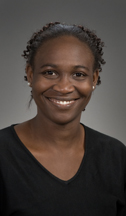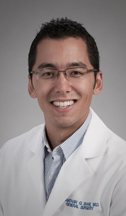Research Resident Past Projects 2012-2014

Meera Kotagal, MD, MPH
Dr. Kotagal completed a two-year T32 training program in Gastrointestinal Surgical Outcomes Research at the Surgical Outcomes Research Center (SORCE), under the guidance of mentor Dr. David Flum, Professor in Surgery in the Division of General Surgery, and Dr. Adam Goldin, Associate Professor in the Department of Pediatric Surgery. In her two years at SORCE, she studied diagnosis and management of pediatric appendicitis, preoperative hyperglycemia in patients without diabetes, and impact of medications in the preoperative period on adverse events. In her second year, she worked with Dr. Flum and Dr. Goldin to develop a statewide collaborative entitled “Safe and Sound,” which is focused on improving the use and quality of ultrasound in the diagnosis of pediatric appendicitis in Washington State. The multidisciplinary collaborative is focused on awareness, clinician behavior and training to improve care for children in Washington. During her two years in the lab, Dr. Kotagal has presented her research at the American College of Surgeons Clinical Congress, as well as at a number of local and regional meetings. Her research has been published in Annals of Surgery and JAMA Pediatrics. Dr. Kotagal’s fellowship provided her with a strong foundation in research methodology as well as invaluable mentoring relationships with Dr. Flum and Dr. Goldin, all of which will continue to be crucial to her success moving forward in her career in pediatric surgery and global surgery.

Lara O. Oyetunji, MD
Dr. Oyetunji undertook a two-year fellowship in the Thoracic and Gastrointestinal Oncology Branch at the National Institutes of Health. She researched esophageal cancer under Principal Investigator Dr. David Schrump. Esophageal cancer is the 6th leading cause of cancer-related deaths worldwide and whereas tobacco abuse has been linked to the development of esophageal cancers, the mechanisms by which cigarette smoke mediates esophageal carcinogenesis have not been fully explained. MicroRNAs have recently been identified as post-transcriptional regulators that play an important role in cancer development and progression. Dr. Oyetunji is utilizing a novel in-vitro model system to examine microRNA alterations potentially contributing to tobacco-induced esophageal carcinogenesis. She has identified novel microRNAs that are dysregulated by cigarette smoke exposure and identified their putative targets. She is currently elucidating the mechanisms such as (invasion, migration and proliferation) by these targets drive esophageal adenocarcinogenesis in in-vitro and in-vivo models. Dr. Oyetunji received the Claude Organ award for her research work which she presented at the 24th Annual Scientific meeting of the Society of Black Academic Surgeons. She was also recently selected as one of the 2014 Society of Thoracic Surgeons “Looking to the Future Scholars.” Dr. Oyetunji returns to the University of Washington as a general surgery resident in the 4+3 integrated cardiothoracic surgery residency program. The last 2 years have been challenging but also a time of personal discovery and professional growth. She met life mentors, made great friends and achieved personal goals, her favorites being running a full marathon and hiking Machu Picchu.

Rebecca E. Plevin, MD
Dr. Plevin completed two years as a T32 trainee in Trauma & Burns under T32 Principal Investigators Drs. Grant O’Keefe, Professor of Surgery, Division of Trauma, Burn, and Critical Care Surgery and Joseph Cuschieri, Professor of Surgery, Division of Trauma, Burn, and Critical Care Surgery & Adjunct Professor of Orthopaedics and Sports Medicine. During her first year of research, she investigated the role of lipopolysaccharide structure in immune cell stimulation during the inflammatory response. Her work culminated in a presentation at the 2013 Department of Surgery Research Symposium, where she was awarded first prize, and a poster at the American Association for the Surgery of Trauma annual meeting. In her second year, Dr. Plevin used data gathered in a large-scale collaborative research program, “the Glue Grant,” to investigate whether early alterations in the gene expression of trauma patients can identify those at risk of worse outcomes. She presented this work at the ACS Committee on Trauma Regional Council, where she received 2nd prize for basic science research, and in a poster at the Shock annual meeting in Charlotte, NC. Dr. Plevin has participated in several other research projects in addition to her primary work with Dr. Cuschieri. She has submitted for publication an investigation into whether automatic crash notification systems in automobiles decrease mortality by improving emergency medical provider response times and preparation for severe automobile collisions. She also served as a member of the editorial board for the Online Clinical Care Algorithms and Messages (OCCAM) database, an online, mobile-optimized, searchable resource for local patient-care algorithms. She has submitted a manuscript describing the process by which OCCAM was created and how it is improving resident use of evidence-based resources in clinical decision-making. Dr. Plevin has thoroughly enjoyed the unique opportunity to explore facets of basic and clinical research related to trauma surgery, as well as to participate in projects related to resident education and systems improvement.

Jonathan G. Sham, MD
Dr. Sham completed two years as a joint T32 fellow in the Department of Surgery and the Department of Materials Science and Engineering. He worked under the mentorship of Dr. James Park and Dr. Satoshi Minoshima, investigating novel diagnostic and therapeutic approaches to hepatobiliary malignancies. During his lab time, Dr. Sham developed a new liver cancer-specific positron emission tomography (PET) imaging probe which has garnered attention from the biopharmaceutical industry and is now in the early phases of clinical translation and human trials. Dr. Sham presented his work at multiple national and international academic conferences and won first prize for best oral presentation at the 2013 Schilling Research Symposium as well as at the 2014 University of Washington Graduate Medical Education Research Day, which features research from across all residency programs in the UW School of Medicine. He has published numerous peer-reviewed articles and three book chapters. Dr. Sham’s research time was critical in developing skills in experimental design, oncologic animal models, advanced imaging technology, and product development. He is committed to using these skills to pursue a career in academic surgical oncology, focusing on translational research to bring new therapies from the bench to the bedside.
